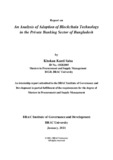| dc.contributor.advisor | Hossain, Shanawez | |
| dc.contributor.author | Saha, Khokan Kanti | |
| dc.date.accessioned | 2021-08-01T05:57:56Z | |
| dc.date.available | 2021-08-01T05:57:56Z | |
| dc.date.copyright | 2021 | |
| dc.date.issued | 2021-01 | |
| dc.identifier.other | ID: 18282005 | |
| dc.identifier.uri | http://hdl.handle.net/10361/14883 | |
| dc.description | This dissertation is submitted in partial fulfillment of the requirements for the degree of Masters in Procurement and Supply Management, 2021. | en_US |
| dc.description | Cataloged from PDF version of dissertation. | |
| dc.description | Includes bibliographical references (pages 51-54). | |
| dc.description.abstract | Blockchain is a key digital technique for ensuring the transparency, speed and
immutability of different banking transactions. The private banking sector of
Bangladesh has started to adopt the blockchain technology in its banking service
management to keep it compatible in the world of virtual transaction. A new technology
should adopt robustly for ensuring scale of economies in scope and scalability to get
designated efficiency and effective over the existing technology. The study investigates
the adoption of blockchain technology in four commercial private banks of Bangladesh.
It is a qualitative study for which data is collected mainly from secondary sources such
as newspaper and journal articles, press release and un-structured interviews with the
relevant bank officials. In this study it is found that the blockchain technology is adopted
in a limited scale applying only for two banking services, Letter of Credit (LC)
settlement and remittance. Though the scope and scalability of this technology adoption
is still insignificant, the efficiency level is high in terms of streamlining processes,
reducing duplicity, increasing transparency and trust, eliminating ambiguities and
discrepancies, enhancing security, reducing paper works, saving costs and time, and
providing services in real-time. The clients of the services rendered from the blockchain
platform of the banks under the study expressed their ecstatic satisfaction about the
service quality. However, the large scale adoption of blockchain technology needs to
overcome the challenges of growing network, less collaboration, low
comprehensiveness, absence of sound regulatory framework and inadequate skilled
human resources. If the banking sector can mitigate these challenges, the blockchain
technology will become the ‘future technology of banking services’. | en_US |
| dc.description.statementofresponsibility | Khokan Kanti Saha | |
| dc.format.extent | 54 Pages | |
| dc.language.iso | en_US | en_US |
| dc.publisher | Brac University | en_US |
| dc.rights | Brac University dissertations are protected by copyright. They may be viewed from this source for any purpose, but reproduction or distribution in any format is prohibited without written permission. | |
| dc.subject | Peer-to-Peer (P2P) | en_US |
| dc.subject | Distributed Ledger Technology (DLT) | en_US |
| dc.subject | Public and Private keys | en_US |
| dc.subject | Letter of Credit (LC) | en_US |
| dc.subject | Remittance | en_US |
| dc.subject | Immutability | en_US |
| dc.title | An analysis of adoption of blockchain technology in the private banking sector of Bangladesh | en_US |
| dc.type | Dissertation | en_US |
| dc.contributor.department | Brac Institute of Governance and Development, Brac University | |
| dc.description.degree | M. Procurement and Supply Management | |

